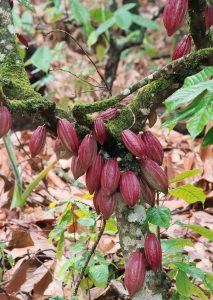- 2 days
- Fri - Sat, 14 - 15 Feb 2025
- 10:00am - 5:30pm
- Casa Rodrigo de Bastida, Santo Domingo, Dominican Republic
- $425
DOMINICAN REPUBLIC - Enter the engaging and complex world of chocolate origins with this structured course focusing on individual cacao origin regions and countries. This tasting-based course will introduce you to the culture, history, varieties and genetics of the origin and give you an understanding of the flavour profiles of chocolate made with cacao from the origin.
Origin: Dominican Republic – classroom study
Our classroom based Origin Study introduction course will be held in Santo Domingo, at the Dominican Republic itself, and will give you a unique and in-depth dive into the origin. More than just a country origin, Dominican Republic has a vibrant history as a cacao producer with a rich genetic mix of cacao and distinct regions such as Duarte, Bejucos, Mirabal and more. With a rich Caribbean genetic mix, the cacao includes old trinitarios and new clonal developments such as neo-nacional white bean cacao. Flavours range from classic chocolate and dark sugars to distinct and elusive oxalic rhubarb notes.
The Dominican Republic was one of the first cacao producing countries to embrace the new wave of fine cacao in the 1990s and has transformed its quality since then. During the course we will taste chocolate made from some of the now well-known sources, as well as new discoveries and approaches.
The course will be taught in English and Spanish, and it will be led by IICCT founders Martin Christy and Dr. Maricel E. Presilla.

Origin Introduction
The origin study program takes the subject of chocolate flavour study to a more detailed level, focusing on each cacao producing country – or region in larger countries. The program will give you the background and knowledge to fully understand the flavour profile of an origin based on its cacao genetics and introductions, climate, farming practices and the culture and history of the origin.
Origin Study is divided into two courses for each origin, beginning with an introductory course, which takes place in a classroom setting or can be taken online. You can then take your origin journey a step further with the Origin Field Study trip, which is based around a field visit to the origin, exploring the culture and cacao sources of the origin in person.
The Origin Introduction course includes tasting of a range of dark chocolate bars made from the origin , representing the traditional ‘classic’ flavour of the origin, as well as new varieties, trends and processes. Through classroom or online learning and tasting, cacao sources within the origin will be given context to help build your understanding of how the origin’s flavour profiles are created and how flavour differs across the origin.

- Tasting and flavour profiling of 15 or more dark chocolate craft bars made with cacao from the origin
- Tasting of commercial versions of the origin, including defect identification
- An overview of the geography and history of the origin
- An introduction to the types and varieties of cacao growing in the origin
- A look at the main cacao producers in the region, including well-known names and lesser-known farms and cooperatives
- A review of changes and developments in the origin, giving you an inside look at new processes and flavours coming from the origin

- Certified IICCT tasters wishing to extend their chocolate learning
- Tasters who want to develop their understanding of individual origins
- Educators who want to develop their background knowledge
- Chocolate makers who want to learn more about the source of the cacao they are using
